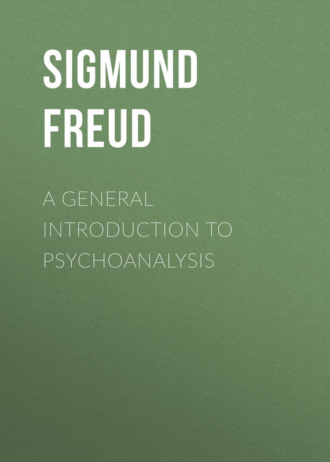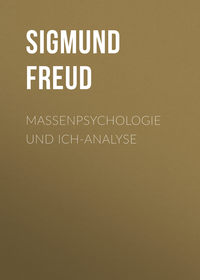 полная версия
полная версияA General Introduction to Psychoanalysis
Phenomena such as these will seem very unusual to you. Perhaps you are inclined to assume that the "indirect" antipathy is enough to characterize the incident as pathological. Yet I can assure you that it also occurs in a normal and healthy setting. I am in no way willing to admit the unreliability of our analytic interpretation. After all, the above-discussed ambiguity of plan-forgetting exists only so long as we have not attempted an analysis of the case, and are interpreting it only on the basis of our general suppositions. When we analyze the person in question, we discover with sufficient certainty in each case whether or not it is a direct antipathy, or what its origin is otherwise.
A second point is the following: when we find in a large majority of cases that the forgetting of a plan goes back to an antipathy, we gain courage to extend this solution to another series of cases in which the analyzed person does not confirm, but denies, the antipathy which we inferred. Take as an example the exceedingly frequent incidents of forgetting to return books which one has borrowed, or forgetting to pay one's bills or debts. We will be so bold as to accuse the individual in question of intending to keep the books and not to pay the debts, while he will deny such an intention but will not be in a position to give us any other explanation of his conduct. Thereupon we insist that he has the intention, only he knows nothing about it; all we need for our inference is to have the intention betray itself through the effect of the forgetfulness. The subject may then repeat that he had merely forgotten it. You now recognize the situation as one in which we once before found ourselves. If we wish to be consistent in our interpretation, an interpretation which has been proved as manifold as it is justified, we will be unavoidably forced to the conclusion that there are tendencies in a human being which can become effective without his being conscious of them. By so doing, however, we place ourselves in opposition to all the views which prevail in daily life and in psychology.
Forgetting proper names and foreign names as well as foreign words can be traced in the same manner to a counter-intention which aims either directly or indirectly at the name in question. I have already given you an example of such direct antipathy. The indirect causation, however, is particularly frequent and generally necessitates careful analysis for its determination. Thus, for example, in war times which force us to sacrifice so many of our former inclinations, the ability to recall proper names also suffers severely in consequence of the most peculiar connections. A short time ago it happened that I could not reproduce the name of that harmless Moravian city of Bisenz, and analysis showed that no direct dislike was to blame, but rather the sound resemblance to the name of the Bisenzi palace in Orrieto, in which I used to wish I might live. As a motive for the antagonism to remembering the name, we here encounter for the first time a principle which will later disclose to us its whole tremendous significance in the causation of neurotic symptoms, viz., the aversion on the part of the memory to remembering anything which is connected with unpleasant experience and which would revive this unpleasantness by a reproduction. This intention of avoiding unpleasantness in recollections of other psychic acts, the psychic flight from unpleasantness, we may recognize as the ultimate effective motive not only for the forgetting of names, but also for many other errors, such as omissions of action, etc.
Forgetting names does, however, seem to be especially facilitated psycho-physiologically and therefore also occurs in cases in which the interference of an unpleasantness-motive cannot be established. If anyone once has a tendency to forget names, you can establish by analytical investigation that he not only loses names because he himself does not like them, or because they remind him of something he does not like, but also because the same name in his mind belongs to another chain of associations, with which he has more intimate relations. The name is anchored there, as it were, and denied to the other associations activated at the moment. If you will recall the tricks of mnemonic technique you will ascertain with some surprise that one forgets names in consequence of the same associations which one otherwise purposely forms in order to save them from being forgotten. The most conspicuous example of this is afforded by proper names of persons, which conceivably enough must have very different psychic values for different people. For example, take a first name, such as Theodore. To one of you it will mean nothing special, to another it means the name of his father, brother, friend, or his own name. Analytic experience will then show you that the first person is not in danger of forgetting that a certain stranger bears this name, while the latter will be constantly inclined to withhold from the stranger this name which seems reserved for intimate relationships. Let us now assume that this associative inhibition can come into contact with the operation of the unpleasantness-principle, and in addition with an indirect mechanism, and you will be in a position to form a correct picture of the complexity of causation of this temporary name-forgetting. An adequate analysis that does justice to the facts, however, will completely disclose these complications.
Forgetting impressions and experiences shows the working of the tendency to keep unpleasantness from recollection much more clearly and conclusively than does the forgetting of names. It does not, of course, belong in its entirety to the category of errors, but only in so far as it seems to us conspicuous and unjustified, measured by the measuring stick of our accustomed conception – thus, for example, where the forgetfulness strikes fresh or important impressions or impressions whose loss tears a hole in the otherwise well-remembered sequence. Why and how it is in general that we forget, particularly why and how we forget experiences which have surely left the deepest impressions, such as the incidents of our first years of childhood, is quite a different problem, in which the defense against unpleasant associations plays a certain role but is far from explaining everything. That unpleasant impressions are easily forgotten is an indubitable fact. Various psychologists have observed it, and the great Darwin was so struck by it that he made the "golden rule" for himself of writing down with particular care observations which seemed unfavorable to his theory, since he had convinced himself that they were just the ones which would not stick in his memory.
Those who hear for the first time of this principle of defense against unpleasant recollections by means of forgetting, seldom fail to raise the objection that they, on the contrary, have had the experience that just the painful is hard to forget, inasmuch as it always comes back to mind to torture the person against his will – as, for example, the recollection of an insult or humiliation. This fact is also correct, but the objection is not valid. It is important that one begin betimes to reckon with the fact that the psychic life is the arena of the struggles and exercises of antagonistic tendencies, or, to express it in non-dynamic terminology, that it consists of contradictions and paired antagonisms. Information concerning one specific tendency is of no avail for the exclusion of its opposite; there is room for both of them. It depends only on how the opposites react upon each other, what effects will proceed from the one and what from the other.
Losing and mislaying objects is of especial interest to us because of the ambiguity and the multiplicity of tendencies in whose services the errors may act. The common element in all cases is this, that one wished to lose something. The reasons and purposes thereof vary. One loses an object when it has become damaged, when one intends to replace it with a better one, when one has ceased to like it, when it came from a person whose relations to one have become strained, or when it was obtained under circumstances of which one no longer wishes to think. The same purpose may be served by letting the object fall, be damaged or broken. In the life of society it is said to have been found that unwelcome and illegitimate children are much more often frail than those born in wedlock. To reach this result we do not need the coarse technique of the so-called angel-maker. A certain remissness in the care of the child is said to suffice amply. In the preservation of objects, the case might easily be the same as with the children.
But things may be singled out for loss without their having forfeited any of their value, namely, when there exists the intention to sacrifice something to fate in order to ward off some other dreaded loss. Such exorcisings of fate are, according to the findings of analysis, still very frequent among us; therefore, the loss of things is often a voluntary sacrifice. In the same way losing may serve the purposes of obstinacy or self-punishment. In short, the more distant motivation of the tendency to get rid of a thing oneself by means of losing it is not overlooked.
Mistakes, like other errors, are often used to fulfill wishes which one ought to deny oneself. The purpose is thus masked as fortunate accident; for instance, one of our friends once took the train to make a call in the suburbs, despite the clearest antipathy to so doing, and then, in changing cars, made the mistake of getting into the train which took him back to the city. Or, if on a trip one absolutely wants to make a longer stay at a half-way station, one is apt to overlook or miss certain connections, so that he is forced to make the desired interruption to the trip. Or, as once happened to a patient of mine whom I had forbidden to call up his fiancée on the telephone, "by mistake" and "absent-mindedly" he asked for a wrong number when he wanted to telephone to me, so that he was suddenly connected with the lady. A pretty example and one of practical significance in making a direct mistake is the observation of an engineer at a preliminary hearing in a damage suit:
"Some time ago I worked with several colleagues in the laboratory of a high school on a series of complicated elasticity experiments, a piece of work which we had undertaken voluntarily but which began to take more time than we had expected. One day as I went into the laboratory with my colleague F., the latter remarked how unpleasant it was to him to lose so much time that day, since he had so much to do at home. I could not help agreeing with him, and remarked half jokingly, alluding to an incident of the previous week: 'Let's hope that the machine gives out again so that we can stop work and go home early.'
"In the division of labor it happened that F. was given the regulation of the valve of the press, that is to say, he was, by means of a cautious opening of the valve, to let the liquid pressure from the accumulator flow slowly into the cylinder of the hydraulic press. The man who was directing the job stood by the manometer (pressure gauge) and when the right pressure had been reached called out in a loud voice: 'Stop.' At this command F. seized the valve and turned with all his might – to the left! (All valves, without exception, close to the right.) Thereby the whole pressure of the accumulator suddenly became effective in the press, a strain for which the connecting pipes are not designed, so that a connecting pipe immediately burst – quite a harmless defect, but one which nevertheless forced us to drop work for the day and go home.
"It is characteristic, by the way, that some time afterward when we were discussing this occurrence, my friend F. had no recollection whatever of my remark, which I could recall with certainty."
From this point you may reach the conjecture that it is not harmless accident which makes the hands of your domestics such dangerous enemies to your household property. But you can also raise the question whether it is always an accident when one damages himself and exposes his own person to danger. There are interests the value of which you will presently be able to test by means of the analysis of observations.
Ladies and gentlemen, this is far from being all that might be said about errors. There is indeed much left to investigate and to discuss. But I am satisfied if, from our investigations to date, your previous views are somewhat shaken and if you have acquired a certain degree of liberality in the acceptance of new ones. For the rest, I must content myself with leaving you face to face with an unclear condition of affairs. We cannot prove all our axioms by the study of errors and, indeed, are by no means solely dependent on this material. The great value of errors for our purpose lies in the fact that they are very frequent phenomena that can easily be observed on oneself and the occurrence of which do not require a pathological condition. I should like to mention just one more of your unanswered questions before concluding: "If, as we have seen in many examples, people come so close to understanding errors and so often act as though they penetrated their meaning, how is it possible that they can so generally consider them accidental, senseless and meaningless, and can so energetically oppose their psychoanalytic elucidation?"
You are right; that is conspicuous and demands an explanation. I shall not give this explanation to you, however, but shall guide you slowly to the connecting links from which the explanation will force itself upon you without any aid from me.
II
THE DREAM
FIFTH LECTURE
THE DREAM
Difficulties and Preliminary ApproachONE day the discovery was made that the disease symptoms of certain nervous patients have a meaning.22 Thereupon the psychoanalytic method of therapy was founded. In this treatment it happened that the patients also presented dreams in place of their symptoms. Herewith originated the conjecture that these dreams also have a meaning.
We will not, however, pursue this historical path, but enter upon the opposite one. We wish to discover the meaning of dreams as preparation for the study of the neuroses. This inversion is justified, for the study of dreams is not only the best preparation for that of the neuroses, but the dream itself is also a neurotic symptom, and in fact one which possesses for us the incalculable advantage of occurring in all normals. Indeed, if all human beings were well and would dream, we could gain from their dreams almost all the insight to which the study of the neuroses has led.
Thus it is that the dream becomes the object of psychoanalytic research – again an ordinary, little-considered phenomenon, apparently of no practical value, like the errors with which, indeed, it shares the character of occurring in normals. But otherwise the conditions are rather less favorable for our work. Errors had been neglected only by science, which had paid little attention to them; but at least it was no disgrace to occupy one's self with them. People said there are indeed more important things, but perhaps something may come of it. Preoccupation with the dream, however, is not merely impractical and superfluous, but actually ignominious; it carries the odium of the unscientific, awakens the suspicion of a personal leaning towards mysticism. The idea of a physician busying himself with dreams when even in neuropathology and psychiatry there are matters so much more serious – tumors the size of apples which incapacitate the organ of the psyche, hemorrhages, and chronic inflammations in which one can demonstrate changes in the tissues under the microscope! No, the dream is much too trifling an object, and unworthy of Science.
And besides, it is a condition which in itself defies all the requirements of exact research – in dream investigation one is not even sure of one's object. A delusion, for example, presents itself in clear and definite outlines. "I am the Emperor of China," says the patient aloud. But the dream? It generally cannot be related at all. If anyone relates a dream, has he any guarantee that he has told it correctly, and not changed it during the telling, or invented an addition which was forced by the indefiniteness of his recollection? Most dreams cannot be remembered at all, are forgotten except for small fragments. And upon the interpretation of such material shall a scientific psychology or method of treatment for patients be based?
A certain excess in judgment may make us suspicious. The objections to the dream as an object of research obviously go too far. The question of insignificance we have already had to deal with in discussing errors. We said to ourselves that important matters may manifest themselves through small signs. As concerns the indefiniteness of the dream, it is after all a characteristic like any other. One cannot prescribe the characteristics of an object. Moreover, there are clear and definite dreams. And there are other objects of psychiatric research which suffer from the same trait of indefiniteness, e.g., many compulsion ideas, with which even respectable and esteemed psychiatrists have occupied themselves. I might recall the last case which occurred in my practice. The patient introduced himself to me with the words, "I have a certain feeling as though I had harmed or had wished to harm some living thing – a child? – no, more probably a dog – perhaps pushed it off a bridge – or something else." We can overcome to some degree the difficulty of uncertain recollection in the dream if we determine that exactly what the dreamer tells us is to be taken as his dream, without regard to anything which he has forgotten or may have changed in recollection. And finally, one cannot make so general an assertion as that the dream is an unimportant thing. We know from our own experience that the mood in which one wakes up after a dream may continue throughout the whole day. Cases have been observed by physicians in which a psychosis begins with a dream and holds to a delusion which originated in it. It is related of historical personages that they drew their inspiration for important deeds from dreams. So we may ask whence comes the contempt of scientific circles for the dream?
I think it is the reaction to their over-estimation in former times. Reconstruction of the past is notoriously difficult, but this much we may assume with certainty – if you will permit me the jest – that our ancestors of 3000 years ago and more, dreamed much in the way we do. As far as we know, all ancient peoples attached great importance to dreams and considered them of practical value. They drew omens for the future from dreams, sought premonitions in them. In those days, to the Greeks and all Orientals, a campaign without dream interpreters must have been as impossible as a campaign without an aviation scout to-day. When Alexander the Great undertook his campaign of conquests, the most famous dream interpreters were in attendance. The city of Tyrus, which was then still situated on an island, put up so fierce a resistance that Alexander considered the idea of raising the siege. Then he dreamed one night of a satyr dancing as if in triumph; and when he laid his dream before his interpreters he received the information that the victory over the city had been announced to him. He ordered the attack and took Tyrus. Among the Etruscans and the Romans other methods of discovering the future were in use, but the interpretation of dreams was practical and esteemed during the entire Hellenic-Roman period. Of the literature dealing with the topic at least the chief work has been preserved to us, namely, the book of Artemidoros of Daldis, who is supposed to have lived during the lifetime of the Emperor Hadrian. How it happened subsequently that the art of dream interpretation was lost and the dream fell into discredit, I cannot tell you. Enlightenment cannot have had much part in it, for the Dark Ages faithfully preserved things far more absurd than the ancient dream interpretation. The fact is, the interest in dreams gradually deteriorated into superstition, and could assert itself only among the ignorant. The latest misuse of dream interpretation in our day still tries to discover in dreams the numbers which are going to be drawn in the small lottery. On the other hand, the exact science of to-day has repeatedly dealt with dreams, but always only with the purpose of applying its physiological theories to the dream. By physicians, of course, the dream was considered as a non-psychic act, as the manifestation of somatic irritations in the psychic life. Binz (1876) pronounced the dream "a bodily process, in all cases useless, in many actually pathological, above which the world-soul and immortality are raised as high as the blue ether over the weed-grown sands of the lowest plain." Maury compared it with the irregular twitchings of St. Vitus' Dance in contrast to the co-ordinated movements of the normal person. An old comparison makes the content of the dream analogous to the tones which the "ten fingers of a musically illiterate person would bring forth if they ran over the keys of the instrument."
Interpretation means finding a hidden meaning. There can be no question of interpretation in such an estimation of the dream process. Look up the description of the dream in Wundt, Jodl and other newer philosophers. You will find an enumeration of the deviations of dream life from waking thought, in a sense disparaging to the dream. The description points out the disintegration of association, the suspension of the critical faculty, the elimination of all knowledge, and other signs of diminished activity. The only valuable contribution to the knowledge of the dream which we owe to exact science pertains to the influence of bodily stimuli, operative during sleep, on the content of the dream. There are two thick volumes of experimental researches on dreams by the recently deceased Norwegian author, J. Mourly Vold, (translated into German in 1910 and 1912), which deal almost solely with the consequences of changes in the position of the limbs. They are recommended as the prototype of exact dream research. Now can you imagine what exact science would say if it discovered that we wish to attempt to find the meaning of dreams? It may be it has already said it, but we will not allow ourselves to be frightened off. If errors can have a meaning, the dream can, too, and errors in many cases have a meaning which has escaped exact science. Let us confess to sharing the prejudice of the ancients and the common people, and let us follow in the footsteps of the ancient dream interpreters.
First of all, we must orient ourselves in our task, and take a bird's eye view of our field. What is a dream? It is difficult to say in one sentence. But we do not want to attempt any definition where a reference to the material with which everyone is familiar suffices. Yet we ought to select the essential element of the dream. How can that be found? There are such monstrous differences within the boundary which encloses our province, differences in every direction. The essential thing will very probably be that which we can show to be common to all dreams.
Well, the first thing which is common to all dreams is that we are asleep during their occurrence. The dream is apparently the psychic life during sleep, which has certain resemblances to that of the waking condition, and on the other hand is distinguished from it by important differences. That was noted even in Aristotle's definition. Perhaps there are other connections obtaining between the dream and sleep. One can be awakened by a dream, one frequently has a dream when he wakes spontaneously or is forcibly awakened from sleep. The dream then seems to be an intermediate condition between sleeping and waking. Thus we are referred to the problem of sleep. What, then, is sleep?
That is a physiological or biological problem concerning which there is still much controversy. We can form no decision on the point, but I think we may attempt a psychological characterization of sleep. Sleep is a condition in which I wish to have nothing to do with the external world, and have withdrawn my interest from it. I put myself to sleep by withdrawing myself from the external world and by holding off its stimuli. I also go to sleep when I am fatigued by the external world. Thus, by going to sleep, I say to the external world, "Leave me in peace, for I wish to sleep." Conversely, the child says, "I won't go to bed yet, I am not tired, I want to have some more fun." The biological intention of sleep thus seems to be recuperation; its psychological character, the suspension of interest in the external world. Our relation to the world into which we came so unwillingly, seems to include the fact that we cannot endure it without interruption. For this reason we revert from time to time to the pre-natal existence, that is, to the intra-uterine existence. At least we create for ourselves conditions quite similar to those obtaining at that time – warmth, darkness and the absence of stimuli. Some of us even roll ourselves into tight packages and assume in sleep a posture very similar to the intra-uterine posture. It seems as if the world did not wholly possess us adults, it has only two-thirds of our life, we are still one-third unborn. Each awakening in the morning is then like a new birth. We also speak of the condition after sleep with the words, "I feel as though I had been born anew," by which we probably form a very erroneous idea of the general feeling of the newly born. It may be assumed that the latter, on the contrary, feel very uncomfortable. We also speak of birth as "seeing the light of day." If that be sleep, then the dream is not on its program at all, rather it seems an unwelcome addition. We think, too, that dreamless sleep is the best and only normal sleep. There should be no psychic activity in sleep; if the psyche stirs, then just to that extent have we failed to reduplicate the foetal condition; remainders of psychic activity could not be completely avoided. These remainders are the dream. Then it really does seem that the dream need have no meaning. It was different in the case of errors; they were activities of the waking state. But when I am asleep, have quite suspended psychic activity and have suppressed all but certain of its remainders, then it is by no means inevitable that these remainders have a meaning. In fact, I cannot make use of this meaning, in view of the fact that the rest of my psyche is asleep. This must, of course, be a question only of twitching, like spasmodic reactions, a question only of psychic phenomena such as follow directly upon somatic stimulation. The dream, therefore, appears to be the sleep-disturbing remnant of the psychic activity of waking life, and we may make the resolution promptly to abandon a theme which is so ill-adapted to psychoanalysis.









